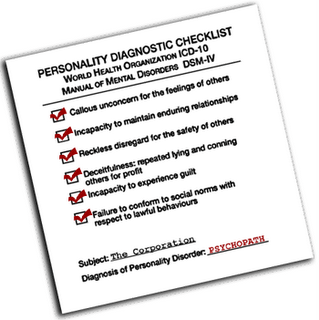10-31
Saturday, November 11, 2006
Joe Cafasso appears to be a psychopath
Most studies of the psychopath have taken place among prison populations, though it has often been suggested that the psychopath is just as likely to sit on a Board of Directors as behind bars, concealing his true nature behind a well crafted "Mask of Sanity" (also the title of the one of the first definitive studies of psychopathy, written by Hervey M. Cleckley in 1941.) Cleckley defined psychopathy thus:[7] It has been shown that punishment and behavior modification techniques do not improve the behavior of a psychopath. They have been regularly observed to respond to both by becoming more cunning and hiding their behavior better. It has been suggested that traditional therapeutic approaches actually make them, if not worse, then far more adept at manipulating others and concealing their behavior. They are generally considered to be not only incurable but also untreatable. Psychopaths also have a markedly distorted sense of the potential consequences of their actions, not only for others, but also for themselves. They do not, for example, deeply recognize the risk of being caught, disbelieved or injured as a result of their behaviour. And that is another reason why he is highly dangerous. Prisons are full of people with this personality disorder, one of the reasons many of us have concluded that imprisonment is the only thing that will stop him.
And that is another reason why he is highly dangerous. Prisons are full of people with this personality disorder, one of the reasons many of us have concluded that imprisonment is the only thing that will stop him.
Psychopaths live their lives not caring about others' feelings, and showing a complete disregard for any sense of social obligation. This is how Joe Cafasso laughs about the pain he inflicts on others with the harangues from his blog. He is egocentric and lacks any insight or sense of responsibility or consequence, his emotions superficial and shallow, if they exist at all. He displays a breathtaking callousness, cunning manipulative skill, and is purely incapable of forming lasting relationships, let alone of any type of love. The true psychopath exhibits emotion which is mimicking other people's emotions, not something he actually feels. Cafasso shows no impulse control and has a low tolerance for frustration and aggression. He displays no sign of empathy, remorse, anxiety or guilt in relation to his behavior. In short, he is truly devoid of conscience.
That last observation - that he doesn't recognize the risk of being caught, disbelieved or injured as a result of his behavior - will be his complete undoing.